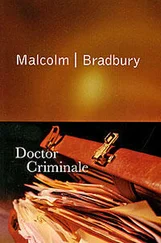Malcolm Bradbury - The History Man
Здесь есть возможность читать онлайн «Malcolm Bradbury - The History Man» весь текст электронной книги совершенно бесплатно (целиком полную версию без сокращений). В некоторых случаях можно слушать аудио, скачать через торрент в формате fb2 и присутствует краткое содержание. Жанр: Современная проза, на английском языке. Описание произведения, (предисловие) а так же отзывы посетителей доступны на портале библиотеки ЛибКат.
- Название:The History Man
- Автор:
- Жанр:
- Год:неизвестен
- ISBN:нет данных
- Рейтинг книги:3 / 5. Голосов: 1
-
Избранное:Добавить в избранное
- Отзывы:
-
Ваша оценка:
- 60
- 1
- 2
- 3
- 4
- 5
The History Man: краткое содержание, описание и аннотация
Предлагаем к чтению аннотацию, описание, краткое содержание или предисловие (зависит от того, что написал сам автор книги «The History Man»). Если вы не нашли необходимую информацию о книге — напишите в комментариях, мы постараемся отыскать её.
The History Man — читать онлайн бесплатно полную книгу (весь текст) целиком
Ниже представлен текст книги, разбитый по страницам. Система сохранения места последней прочитанной страницы, позволяет с удобством читать онлайн бесплатно книгу «The History Man», без необходимости каждый раз заново искать на чём Вы остановились. Поставьте закладку, и сможете в любой момент перейти на страницу, на которой закончили чтение.
Интервал:
Закладка:
One of the results of this was that things became surprisingly better between the two of them. For the first time, they were giving shape to their lives, making a statement, and doing it out of their own skill and craftsmanship, working together. Watermouth began to please them more and more; they found shops where you could buy real yoghourt, and home-baked bread. They acquired a close, companionable tone with each other, partly because they had not made other friends yet, acquired other points of reference, partly because the people they did meet treated them as an interesting, attached couple. Towards Christmas, Howard got a large royalty cheque for his book, and put most of the money into the house, buying some white Indian rugs that would cover the downstairs floors. Barbara's was a smaller, more manageable pregnancy this time. Because they lived in a slum area, she got a good deal of treatment and, though it was a second baby, she was allowed forty-eight hours in hospital after the delivery. Howard was there, instructive in his white mask, as she produced the new child. It was a simple, routine delivery, she knew the rhythms perfectly: an elegant achievement, and one that, this time, seemed to offer no direct threat to Howard. He had not had time to get on with another book, but he was deep in pleasure with his new job; he had good students, and the courses he was working out were going well, amassing a considerable following. The house was now in good shape for the baby to come back to; it had its own room, as did the older child; the floors were clean, and there was a sound kitchen. The baby lay in its carrycot in its room; a lot of people came by; they spent a buoyant Christmas. 'I never wanted any possessions, never,' you could hear Barbara saying, as they stood in the house, during the parties they now started to give. 'I never wanted marriage; Howard and I just wanted to live together,' she said too, as they met more and more people. 'I never wanted a house, just a place to be in,' she also said, as they looked around at the bright clean walls and the clear wood floors, 'they can pull it down when they like now.' But the house was a perfect social space, and it was regularly filled with people; and as time went on and the place became a centre it seemed harder and harder to think that it ever could be.
As it turned out, there were a lot of people, and a lot of parties, in Watermouth. All through that autumn they had been going to them, in the gaps between working on the house: student parties, political parties, young faculty parties, parties given by vague, socially unlocated swingers who were in town for a while and then disappeared. There were even formal parties; once they were invited out by Howard's head of department, Professor Alan Marvin, that well-known anthropologist, author of a standard work entitled The Bedouin Intelligentsia. Marvin was one of the originators, the founding fathers, of the university at Watermouth; these were already a distinguishable breed, and, like most of the breed, the Marvins had chosen to live in a house of some dignity in the countryside on the further side of the university, in that bewildering world of paddocks and stables Henry had adopted. The Kirks had already made their mark with the young faculty, but they were instinctively at odds with the older ones; they had a clearheaded refusal to be charmed, or deceived by apparent or token innovation. They drove out in their minivan, self-consciously smelling of the turpentine they had used to get paint off themselves after an afternoon's work on the house, a smell that gave them the free-floating dignity of craftsmen. The Marvins' house turned out to be an old, white-washed converted farmhouse; there were Rovers and Mercedes parked in the drive when they arrived. Howard's colleagues had warned him that the Marvins lived in a certain Oxbridge dignity, even though Marvin himself was, in the department, a shabby little man who always wore three pencils held by metal clips in his top pocket, as if research and accurate recording of data were never very far from his mind. And so it was; in an ostentatious gesture, lights had been strung in the trees of the big gardens that surrounded the house, and there were people in suits-the Kirks saw suits infrequently-on the lawn, where white wine, from bottles labelled 'Wine Society Niersteiner', were being served by quiet, recessive students. The Kirks, Howard in an old fur coat, Barbara in a big lace dress spacious enough to contain the bump of her pregnancy, felt themselves stark against this: intrusive figures in the scene. Marvin took them around, and introduced them, in the near dark, to many faces; only after a while did it dawn upon the Kirks that these were people in disguise, and that these faces he was meeting, above the suits, were the faces of his own colleagues, clad in the specialist wear they had acquired from marriages and funerals, supporting ceremony.
In the adjacent countryside, disturbed birds chattered, and sheep ran about heavily and snorted; Howard stared, and wondered at his place in all this. Barbara, who was cold, went inside, escorted by a punctilious Marvin, concerned about her pregnancy; Howard found himself detained in lengthy conversation by a middle-aged man with a benign, self-conscious charm, and the healthy, crack-seamed face of an Arctic explorer. Moths flew about them while they talked. Howard, in his fur coat, discoursed on a topic he had grown greatly interested in, the social benefits and purgative value of pornography in the cinema. 'I've always been a serious supporter of pornography, Dr Kirk,' said the man he was talking to, 'I have expressed my view in the public forum many times.' It dawned on Howard, from the tone of demotic regality in which he was being addressed, that he was talking to no other person than Millington Harsent, that radical educationalist, former political scientist, well-known Labour voter and mountain climber, who was Vice-Chancellor of the university of which Howard was now a part. He was a man of whom Howard had heard much; the radical aroma, the sense of educational freshness, that the colour supplements and professional journals had found in Watermouth were said to emanate from him. More locally, he had the reputation of suffering from building mania, or, as it was put, an Edifice Complex, and to have put many of his energies into dreaming up, along with Jop Kaakinen, the futuristic campus where Howard taught. It is hard to be a Vice-Chancellor, who must be all things to all men; Harsent had won the reputation for being this, but in reverse; he was thought by the conservatives to be an extreme radical, by the radicals to be an extreme conservative. But now this man, who was known for bonhomous democracy (he rode round the campus on a bicycle, and was said to have smoked pot occasionally at student parties), stood before Howard, and spoke to him warmly, and squeezed one of his shoulders, and congratulated the university on Howard's presence there, and discussed his book as if he knew what was in it; Howard warmed, and felt at ease. 'I can't tell you how pleased we are to have someone of your stature here,' said Harsent. 'You know,' said Howard, 'I'm quite pleased to be here.'
Harsent and Howard passed into the house together, in search of the source of the Niersteiner; Harsent pressed on Howard, out of a briefcase in the hall, a copy of the university's development plan, and a special brochure, an elegant document printed on dove-grey paper, and written five years earlier still, at the beginning of all these things, by Jop Kaakinen, whose inspired buildings were springing everywhere into existence on campus. 'That's Genesis,' said Harsent, 'I suppose you might say we're in Numbers now. And, I'm afraid, getting close to Job and Lamentations.' Harsent moved on to speak to other guests, doing his social duty; Howard stood with a glass of wine in Marvin's kitchen, with its Aga cooker and an old bread oven in the wall, and studied the brochure. It was called 'Creating a Community/Building a Dialogue', and on the cover was a drawing of five students, for some reason in that state of crotchless nudity beloved of the stylists of the early sixties, and talking to each other in a very energetic dialogue indeed. Inside Howard read, in facsimile handwriting: 'We are not alone making here the new buildings; we are creating too those new forms and spaces which are to be the new styles of human relationship. For an architecture is a society, and we are here making the society of the modern world of today.' Howard put down the brochure, and went out, under the low oak beams of the living-room, to survey his colleagues, chattering on the darkness of the lawn; he thought about the contrast between this rural place and the tall Kaakinen buildings that were transforming the ancient estate where the university stood. After a while, he looked around the house and found Barbara, lying on a sofa in an alcove, her head in the lap of a senior lecturer in Philosophy. 'Oh, boy,' said Barbara, 'you've made a good impression. The Vice-Chancellor came and found me, just to tell me how much he liked you.'
Читать дальшеИнтервал:
Закладка:
Похожие книги на «The History Man»
Представляем Вашему вниманию похожие книги на «The History Man» списком для выбора. Мы отобрали схожую по названию и смыслу литературу в надежде предоставить читателям больше вариантов отыскать новые, интересные, ещё непрочитанные произведения.
Обсуждение, отзывы о книге «The History Man» и просто собственные мнения читателей. Оставьте ваши комментарии, напишите, что Вы думаете о произведении, его смысле или главных героях. Укажите что конкретно понравилось, а что нет, и почему Вы так считаете.











